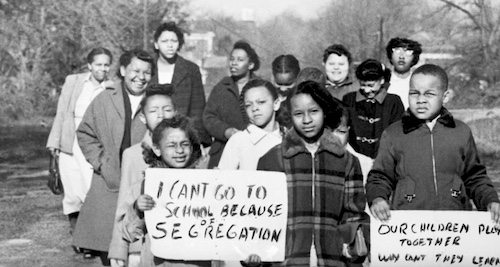Communiqué
Examine the little-known fight for school desegregation led by a handful of Ohio mothers in THE LINCOLN SCHOOL STORY – July 7 at 5:30 pm
< < Back to examine-the-little-known-fight-for-school-desegregation-led-by-a-handful-of-ohio-mothers-in-the-lincoln-school-story-july-7-at-530-pmThe Lincoln School Story
Wednesday, June 19 at 6:30 pm
 THE LINCOLN SCHOOL STORY documentary film tells the inspiring story of a group of courageous African American mothers who fought for school integration from 1954 – 1956 in the town of Hillsboro, Ohio. After the Brown v. Board of Education decision, these mothers marched with their children to the white elementary school, demanding admission—only to be turned away. Their lawsuit against the school board was one of the first test cases of the Brown decision. Despite segregationist redistricting, cross burnings, job losses, and legal threats, they marched for two years in one of the longest sustained civil rights marches in American history. Produced by award-winning filmmaker Andrea Torrice and Ohio Humanities, THE LINCOLN SCHOOL STORY is the first documentary to feature these women and highlight their role in the early civil rights movement.
THE LINCOLN SCHOOL STORY documentary film tells the inspiring story of a group of courageous African American mothers who fought for school integration from 1954 – 1956 in the town of Hillsboro, Ohio. After the Brown v. Board of Education decision, these mothers marched with their children to the white elementary school, demanding admission—only to be turned away. Their lawsuit against the school board was one of the first test cases of the Brown decision. Despite segregationist redistricting, cross burnings, job losses, and legal threats, they marched for two years in one of the longest sustained civil rights marches in American history. Produced by award-winning filmmaker Andrea Torrice and Ohio Humanities, THE LINCOLN SCHOOL STORY is the first documentary to feature these women and highlight their role in the early civil rights movement.
“When you see the documentary, it is troubling that there was such hostility and opposition to something that makes so much sense. The treatment was inexcusable and wrong, and the film makes you uncomfortable,” said David Descutner, an Athens resident who serves on the Ohio Humanities Board and was a financial supporter of the project. “But it is important to share true stories that make you uncomfortable and allow us to learn and grow and imagine a better society. This kind of self-reflection gives us all a better sense of possibility for what we want our society to be.”
 “We want this story to become a story that people know nationally,” said Ohio Humanities Executive Director Rebecca Asmo. “A lot of the marchers, who were children at the time, grew up without talking about this story very much. They kept it quiet, didn’t even tell their own children that they were a part of it, because they thought it would cause friction in the community. But this story is so important because of the length of the protest and the fact that it was led by women and children. These women and children were some of the first protestors in the Civil Rights Movement.”
“We want this story to become a story that people know nationally,” said Ohio Humanities Executive Director Rebecca Asmo. “A lot of the marchers, who were children at the time, grew up without talking about this story very much. They kept it quiet, didn’t even tell their own children that they were a part of it, because they thought it would cause friction in the community. But this story is so important because of the length of the protest and the fact that it was led by women and children. These women and children were some of the first protestors in the Civil Rights Movement.”
The film is being shown across the country on PBS stations this summer. In addition to the film, Ohio Humanities is working with the Ohio University Press on a book, and has already created a children’s book that tells the story of the Lincoln School marchers.
“The Lincoln School story is an example of a part of Ohio history that was almost lost, because it was reported heavily in Black news publications, but less so in the papers of record. Black papers were not digitized like other newspapers are, which speaks to the structural racism of history in what gets documented and remembered,” said Asmo. “So, in the production of this film and children’s book, our team went through archives in Highland County and digitized a lot of those news reports, so they are now available to the public.”
 “We were very happy to be able to support the creation of this film and the children’s book,” said Descutner. “We made our donation for the children’s book in honor of two extraordinary women whose whole lives exemplify what the Lincoln School marchers were about, Ada-Woodson Adams and the late Francine Childs. I’m thrilled this film is being shown.”
“We were very happy to be able to support the creation of this film and the children’s book,” said Descutner. “We made our donation for the children’s book in honor of two extraordinary women whose whole lives exemplify what the Lincoln School marchers were about, Ada-Woodson Adams and the late Francine Childs. I’m thrilled this film is being shown.”

